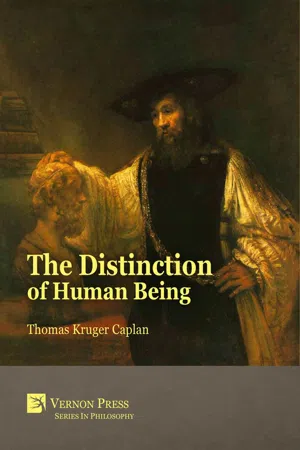
The Distinction of Human Being
An Introduction to the Logotectonic Method of Conception
- English
- ePUB (mobile friendly)
- Available on iOS & Android
The Distinction of Human Being
An Introduction to the Logotectonic Method of Conception
About this book
Perhaps we are never done with thought, nor should be. If this is indeed the case, then Kant may have been right after all in supposing that folks will never lose interest in metaphysics, in thought thinking thought. But what of academics? Where would we find these days a comprehensive treatment of pure reason, of the epochs of its origins and accomplishments, that is not just another collection of interpretations of “source” texts in translation?
This study introduces philosophy students and professionals to the “logotectonic” method of conception as developed by Heribert Boeder, a pupil of Martin Heidegger, which is broadly structuralist in its approach but endeavors to make evident how the principles of rationality governing the Occidental tradition of λóγος (logos) – even those dictated by the animus of our post/modern world of thought in opposition to it – are, in fact, founded upon the “nature” of pure reason itself, the intellect, the discipline, and the art of which can be understood as constituting a unique “language” containing a vocabulary of distinguished terms, a syntax that determines their ratios, and rules of inference with which these terms of principle, insight, and issue are built into trains of thought about thought, every thought.
As a result, the wisdom of the Muses (Homer, Hesiod, Solon), of the Holy Spirit (the Synoptic Narratives of Mark, Luke, and Matthew, the Apostolic Letters of Paul, the Gospel of John), and of Humanity (Rousseau, Schiller, Hölderlin) can be seen to have thrice articulated, in their own terms, a moving vision of our experience with the distinction of human being, inspiring critical reflection to consider the λóγος as a destiny with regards to which even we, as the thinkers, the doers, and the builders of today, are still learning what it means to make a difference.
‘The Distinction of Human Being’ offers contemporary thinkers, beginners as well as professionals, a comprehensive reading of the origin and the tradition of metaphysics encompassing the life and times of pure reason as it unfolds across its theoretical, practical, and poetic endeavor the last of which suggests what a philological philosophy might entail and demand of a new generation of friends of wisdom.
Frequently asked questions
- Essential is ideal for learners and professionals who enjoy exploring a wide range of subjects. Access the Essential Library with 800,000+ trusted titles and best-sellers across business, personal growth, and the humanities. Includes unlimited reading time and Standard Read Aloud voice.
- Complete: Perfect for advanced learners and researchers needing full, unrestricted access. Unlock 1.4M+ books across hundreds of subjects, including academic and specialized titles. The Complete Plan also includes advanced features like Premium Read Aloud and Research Assistant.
Please note we cannot support devices running on iOS 13 and Android 7 or earlier. Learn more about using the app.
Information
- Introduction
- 1. Our Theme in a Nutshell
Table of contents
- Acknowledgement
- Table of Contents
- Figures
- Preface
- Introduction
- The First Part The Topology of Principles
- 18. The Chiral Rhythm of Distinction
- 25. The Determination of Practical Thought
- 38. Saint Anger
- The Second Part The Determination of Our Method
- 61. The Dialectic of Terms
- The Third Part The Point of Departure of our Study
- The Fourth Part The Issue of Wisdom's Holy Writs
- The Third Epoch – The Autonomy of Humanity
- 89. The Virtue of Love
- 97. The Mirror Stage
- 107. Consecration and Celebration
- 112. The Language of Christianity
- 119. The Paradox of Glory
- 124. Preaching the Word of God
- The First Epoch – the Just Being of Destiny
- 136. Outstanding Being
- 145. The Gods are with us
- 151. The Just Fruits
- Conclusion
- Bibliography
- Note on the Author